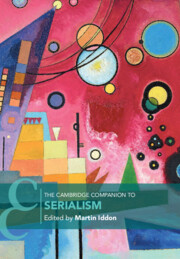Book contents
- The Cambridge Companion to Serialism
- Cambridge Companions to Music
- The Cambridge Companion to Serialism
- Copyright page
- Contents
- Figures
- Tables
- Contributors
- Preface
- Part I Contexts I
- Part II Composers
- Part III Geographies
- Part IV Contexts II
- 18 Towards an Authentic Interpretation of Serial Music
- 19 Metamorphoses of the Serial (and the ‘Post-Serial’ Question)
- 20 Technologies and the Serial Attitude
- References
- Index
19 - Metamorphoses of the Serial (and the ‘Post-Serial’ Question)
from Part IV - Contexts II
Published online by Cambridge University Press: 07 March 2023
- The Cambridge Companion to Serialism
- Cambridge Companions to Music
- The Cambridge Companion to Serialism
- Copyright page
- Contents
- Figures
- Tables
- Contributors
- Preface
- Part I Contexts I
- Part II Composers
- Part III Geographies
- Part IV Contexts II
- 18 Towards an Authentic Interpretation of Serial Music
- 19 Metamorphoses of the Serial (and the ‘Post-Serial’ Question)
- 20 Technologies and the Serial Attitude
- References
- Index
Summary
While the ‘post-serial’ has been a resilient critical category over more than half a century, its status remains problematised by ongoing debates around the nature and limits of the serial itself. In particular, as insight grows into European serial practice after World War II, so does the case for understanding serialism as a more capacious concept than hitherto, embracing not only technique but also aesthetic and – a category regarded as taboo by certain of its practitioners – style. The generalisations that serialism underwent in the 1950s led less to a rigidly deterministic model of ‘total’ serialism than to a proliferation of the concept in many directions. Its seemingly endless possibilities of permutation led it (surprisingly to some) towards the statistical and the aleatory, while its notion of the ‘parameter’ went at times beyond the conventional categories of pitch and rhythm to embrace the manipulation of text, action and gesture. If relatively few composers now profess an overt allegiance to serialism, fewer still can entirely avoid the explicit reflections on material and process that it stimulated.
Keywords
- Type
- Chapter
- Information
- The Cambridge Companion to Serialism , pp. 317 - 339Publisher: Cambridge University PressPrint publication year: 2023

